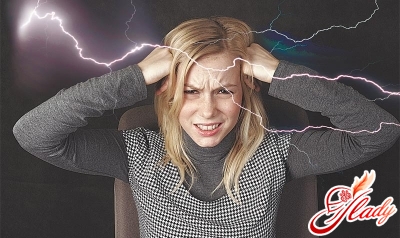 As the person ages, his body little by little"Wear out", many organs and entire systems start to work with interruptions. To the great regret, to any extent this applies to any person. Time is inexorable and no one in the world has hid from its impact. First of all, the person begins to worsen the functioning of the cardiovascular system. Brain disorders are the most common problems of the cardiovascular system. In this article, we will talk about transient disorders of cerebral circulation, since they are most often found.
As the person ages, his body little by little"Wear out", many organs and entire systems start to work with interruptions. To the great regret, to any extent this applies to any person. Time is inexorable and no one in the world has hid from its impact. First of all, the person begins to worsen the functioning of the cardiovascular system. Brain disorders are the most common problems of the cardiovascular system. In this article, we will talk about transient disorders of cerebral circulation, since they are most often found.
Causes of development of cerebral circulation disorders
Most often, transient disorders of the brainblood circulation takes place in the event that a person suffers from arteriosclerosis of blood vessels or hypertensive disease. And the more pronounced these diseases are, the more serious are the disorders of cerebral circulation. That is why it is by no means inadmissible to leave these diseases without due attention, and even more so without treatment. In addition, it is very important to remember that disorders of cerebral circulation can develop against the background of chronic fatigue syndrome. In this case, a person should consult a doctor as soon as possible to treat chronic fatigue syndrome. This condition of a person can lead to the disruption of the functioning of such body systems as the endocrine, digestive, and, of course, cardiovascular. And the constant stressful situations in which a person gets, also do not give him health. In addition to impaired cerebral circulation and arterial hypertension, stress can lead to the development of nervous breakdowns, central nervous system dysfunction. And the violation of the blood circulation of the brain under stressful situations is also quite serious. As already mentioned above, there is a very high probability of developing cerebral circulation in those people who suffer from arteriosclerosis of the vessels. And atherosclerosis is a blockage of blood vessels with cholesterol plaques. Therefore, it is so important to constantly monitor the level of cholesterol in the blood. It is also very important to pay enough attention to the issue of nutrition - the diet of a sick person should be coordinated with a doctor - a nutritionist, and in his absence - with a doctor - therapist.
- Various head injuries
Violation of the blood circulation of the brain canarise due to craniocerebral injuries of a very different severity. And more often in the event that there was a trauma, disturbance of cerebral circulation arises because of intracranial hemorrhage. The more extensive the hemorrhage - the more violated the process of blood circulation in the vessels of the brain.
- Excessive physical stress
Sometimes, in violation of cerebral circulation,exert excessive physical stress. And not always it is a question of intensive physical exertion. Often, the banal sitting at the computer in an uncomfortable position leads to unnecessary strain on the muscles of the back and neck and, as a consequence, the disturbance of cerebral circulation.
- Violation of cerebral circulation from behind the cervical spine
Scoliosis, osteochondrosis ... These words are heard by everyone,However, very few people know what the consequences of these diseases are. In fact, they can be quite serious - after all, the spine in the body plays a huge role. And any diseases of the spine entail pathological changes in the body, a violation of the functioning of certain organs, depending on which part of the spine has suffered. So, for example, with the disease of the cervical spine very often causes the development of cerebral circulation.
Symptoms of cerebral circulation disorders
Of course, at the initial stages of the diseaseviolation of normal cerebral circulation at first time can be asymptomatic, in no way not making itself felt. However, like any other disease, impaired cerebral circulation, in the absence of necessary treatment, is rapidly progressing, and the sick person begins to experience malaise. Symptoms of circulatory disorders of the brain:
- Headache
Headache, as a rule, is the very firsta signal that with the circulation of the brain is not all right. The most common mistake of most people is that a person ignores the appearance of headaches, preferring to hike to the doctor taking conventional pain medications. However, such a tactic of behavior is extremely fraught with the most severe consequences - strokes, in particular. That is why, in the event that a person begins to experience systematic headaches, he should as soon as possible seek help from a neurologist. The doctor, based on the results of the examination of a sick person and his complaints, will establish a diagnosis and prescribe the necessary treatment, which will greatly facilitate the patient's condition.
- Pain in the eyes
Pain in the eyes, which increases with movementeyeballs, also in most cases testifies to the fact that a person has somehow broken cerebral circulation. This phenomenon is especially pronounced at the end of the day, when the eyes are already tired from stress during the working day. As soon as a person has noticed a similar pain that occurs during the movement of the eye, he should seek medical help as soon as possible. And the sick person can ask for help as a doctor = an oculist, and to a doctor - a neurologist.
- Dizziness
Frequent occurrence of a feeling of dizziness alsorequires extremely close attention on the part of the sick person. In the event that dizziness occurs more than 3 times a month, a person should immediately consult a doctor. In addition to the violation of normal cerebral circulation, dizziness may result in a number of other disorders, for example, iron deficiency anemia or a disruption of the normal functioning of the central nervous system. Both diseases are no less dangerous than cerebral circulation.
- Nausea and vomiting
Occurrence of nausea and vomiting, as a rule, more oftenall is noted at those or other disturbances of functioning of the gastrointestinal tract. However, if nausea and vomiting are accompanied by a headache, eye pain during movement, or dizziness, a sick person is shown immediate consultation with a neurologist's doctor. As a rule, about the same phenomena are inherent in various types of cerebral circulation disorders, including stroke.
- Sneezing, noise and ringing in the ears
Also, if there is a disturbance of the cerebral circulationoften sick people complain of a periodic ringing in the ears or a feeling of stuffiness, as if the ears got water. And the more severely impaired the circulation of the brain, the more often and more prolonged such phenomena.
- Changes in the consciousness of a sick person
Also, particularly severe forms of brain damageblood circulation can be accompanied by a temporary change in consciousness and perception: a person can be overly excited or, on the contrary, feel stunned, or completely lose consciousness at all. All these conditions are extremely dangerous for human health, and are an important reason for immediate medical treatment. In the same case, if a person has lost consciousness, the best option for him will be to call the ambulance team.
- Convulsions
Much less often, but at times, a disorder of cerebral circulation can become causal for the onset of convulsive phenomena of various types.
- Numbness
Also, often suffering from a violation of the brainblood circulation, people complain of feeling numbness in the hands, feet, or other parts of the body. And numbness does not arise as usual, if the limb of a person was for a long time in an uncomfortable position, but just like that. This is a direct consequence of impaired blood circulation in the vessels of the brain. In addition to the above symptoms, there are a number of cerebral symptoms that occur during cerebral crises. First, the patient has vegetative disorders such as fever or chills. After this, as a rule, the blood pressure level rises significantly. Also often in patients with impaired cerebral circulation during the exacerbation of the disease appear meningeal phenomena and a significant strain of all the muscles of the head, and especially the occipital. A sick person is hurt not only by the head - he feels a strong weakness and discomfort throughout the body. However, severe attacks of exacerbation of cerebral circulation disorders can occur against a background of non-hypertonic, but, on the contrary, hypotonic crisis. In this case, the blood pressure level is significantly reduced. The person also experiences the strongest indisposition - weakness in the whole body, dizziness, often there are faints. The human integument acquires a pale color, cold sweat may appear, the heart rate is significantly reduced. Sometimes neurological symptoms help the doctor determine which cerebral hemisphere the blood circulation is disturbed. So, for example, if blood circulation is disturbed in the cerebral hemispheres, paresis often occurs - the sensitivity of individual parts of the body is disturbed, the patient complains of numbness, tingling of the limbs, face or some areas of the skin. In especially severe cases, a sick person may experience a decrease in sensitivity, from insignificant to total loss. In the same case, if blood circulation in the cerebral trunk is disturbed, dizziness often occurs, a violation of the normal coordination of movement, twitching of the eyeballs and eyelids, especially when looking away, a significant loss of sensitivity of the tongue, severe weakness in the extremities. The swallowing process is also quite often disrupted. 
Features of headache in cases of cerebral circulation disorders
As you know, a headache can occurdue to a variety of causes: stress, fatigue, stress, various diseases. And every headache has its own peculiarities. There was an exception and a violation of the blood circulation of the brain - the pain with it is also very specific. In the initial stage of the circulatory disturbance of cerebral vessels, the headache is rather blunt. It makes itself felt not periodically, but only during physical or mental stress, or general fatigue of a person. As a rule, it is the fatigue of a sick person at first and writes off the appearance of a headache. However, as progression occurs, ringing and tinnitus, dizziness and the like symptoms appear. Also, there are first signs that the blood supply to the brain is not intense enough. Such signs include:
- Memory loss
As the progression of circulatory disordersthe brain in a person there is a significant decrease in memory. And the memory is reduced only to current events - the person does not remember the planned cases, forgets where he put this or that thing. In this case, a person perfectly remembers what happened in the past. In no case can you ignore the decline in memory, since this in any case signals the presence of problems with human health.
- Occurrence of absent-mindedness
Also, often a violation of the circulation of the headthe brain leads to the fact that before an attentive and collected person becomes extremely scattered. Strictly speaking, absent-mindedness is almost always a companion of low memory.
- Decreased performance
Decrease in efficiency is also very commonoccurs in people with impaired blood circulation of the brain. It is very difficult for them to focus their attention on something for a long time. The person very quickly gets tired - as a rule, already by noon a person gets the impression that he has already worked full time.
- Emotional instability
It goes without saying that the increasedfatigue and constantly poor state of health can not but affect the emotional state of a person. Increased irritability, emotional instability, groundless aggression, tearfulness - all these phenomena are not so rare in the violation of cerebral circulation.
- Sleep disturbance
Very often, many people complain of a violationsleep, often for the first time without cause. However, increased sleepiness, when a person can not get enough sleep and wants to sleep all the time, or, on the contrary, insomnia, also often testifies to the fact that a person has impaired cerebral circulation. In any case, insomnia should alert and serve as an excuse for seeking medical help, regardless of what exactly it is caused. During the same acute attack of cerebral circulation disorders, the headache is of a completely different nature. The pain appears suddenly, but very quickly, most often accompanied by severe ringing or noise in the head, dizziness, a disorder of normal coordination of movement. After this, you may experience a feeling of nausea, a single or prolonged vomiting, black spots or flickering dots appear before your eyes. A person can fall into a stupor or, on the contrary, experience an unexplained emotional arousal. In particularly severe cases, a person can have pronounced convulsive seizures, paresis, convulsions. A person can lose consciousness, and after recovering, they fall asleep and sleep for a long time. After such an attack a person feels broken for several days. At first, such attacks are very rare. However, as the disease progresses, seizures recur more and more often. And if the disease is not treated, then sooner or later, one of these seizures can result in a stroke. This is another reason to call a doctor as soon as possible, when the disease is just beginning to make itself felt.
First aid for attacks of normal cerebral circulation
At the moment when a person is experiencing an attackit is extremely important to provide him with timely and correct medical care. This will help not only to avoid a stroke, but also to ease the condition of a sick person. The first thing to do during an attack is to measure the blood pressure level and determine the heart rate. In the event that cardiac activity is weakened, or the blood pressure level is excessively elevated or, on the contrary, lowered, it is necessary to deliver the sick person to the medical facility as soon as possible, or, if there is no such possibility, to call an ambulance brigade. Independently to give a sick person any kind of medical preparations, unless they have been appointed by the attending physician. Do not exceed the dosage in any case - this can lead to even worse results.
Prevention of cerebral circulation disorders
The treatment takes quite a long timetreatment and quite difficult. In order for the treatment of cerebral circulation disorders to be successful, it must be comprehensive. A very wide range of medicines is used to treat this disease. Medications have a strong enough effect, so in no case can not take them without the appointment of a doctor. All drugs are selected strictly individually, taking into account such factors as:
- Age of the sick person.
- The weight of a sick person.
- Causes that caused impaired cerebral circulation.
- Duration of the disease.
- Results of examination of a sick person.
- Features of the course of the disease.
Treatment can last a long time and take awaymany forces. And, unfortunately, not always this treatment is as effective as it would be desirable, despite all the efforts of doctors. Therefore, it is much more reasonable and effective to prevent the development of cerebral circulation disorders. Or, at least, start treatment as early as possible, not allowing the disease to progress. Particularly attentive to their health should be people suffering from certain groups of the disease. They fall into the so-called "risk group". Such diseases include:
- Hypotonic disease - lowering of blood pressure.
- Hypertensive disease - increased blood pressure.
- Atherosclerosis of blood vessels - occlusion of the lumen of blood vessels with cholesterol plaques.
- Vegetosovascular dystonia.
- All diseases of the cardiovascular system.
- Have past strokes and heart attacks.
In addition, the following people are also at risk:
- People suffering from chronic iron deficiency anemia.
- People working in a harmful enterprise.
- People who, according to their profession, have significant stresses on the cardiovascular system: divers, pilots, flight attendants and the like.
All people who fall into the above "groupsrisk "should closely monitor their health. At the slightest of the above signs of cerebral circulation disorders, described above, a person should as soon as possible seek help from a doctor. As mentioned above, the sooner a violation of the full blood circulation of the brain is diagnosed, the easier it will be to get rid of it. In order to monitor the condition of a sick person, it is necessary to regularly monitor the condition of his blood. Very important are indicators such as blood viscosity and the number of platelets contained in it. In the event that the viscosity of the blood is too high, its current through the blood vessels becomes quite difficult. In such cases, doctors prescribe to the sick person the necessary drugs that dilute the blood. Regular regular monitoring of the blood pressure level is also necessary. Your doctor will explain to you how and at what time it is necessary to measure blood pressure. Many doctors recommend patients to conduct a special notebook, in which it is necessary to record all indications of blood pressure measurement. Thus, control over the level of pressure will be more accurate, which will allow to take the necessary measures in time and prevent the development of an attack, allow the doctor to monitor changes in your blood pressure and, accordingly, the course of the course of the disease. In addition, most often for the treatment of cerebral circulation disorders, doctors use maintenance therapy. This means that a sick person will have to take certain drugs on a regular basis, according to the scheme that the doctor will appoint him. What kind of drugs will be prescribed, can only be solved by a doctor, since he knows all the features of the course of the disease in humans. As a rule, if the circulatory disturbance is not strong, doctors prescribe sleeping pills and soothing drugs, such as valerian, motherwort, novopassit. In the same case, if the violation of the blood circulation of the brain is accompanied by headache, dizziness, vomiting, nausea, more potent drugs are used that are intended to improve the blood circulation of the brain, to remove all its unpleasant symptoms, to alleviate the general condition of the sick person. It is equally important to pay close attention to such a nuance as the way of life of a sick person. Very often people completely ignore this question, believing that doctors are betraying it with an overly exaggerated value. However, in fact, this is not so. Think for yourself - the downed mode of the day, lack of sleep, lack of walks and, as a result, lack of oxygen, constant stress, heavy food, excessive weight - all this can not affect the functioning of the body? And in the event that a person reconsiders his attitude towards his way of life, begins to give him a little more time, abandons some of his habits, such a question as therapy for cerebral circulation disorders can never rise before him. And if for some reason the disease still could not be avoided, its course will be much easier, and the treatment will be more productive. No wonder the humorous wisdom says - "saving the drowning people is the work of the drowning themselves". Well, our health is in our hands! We advise you to read:









